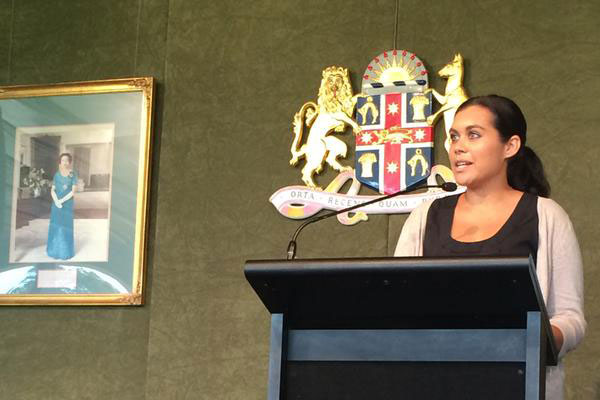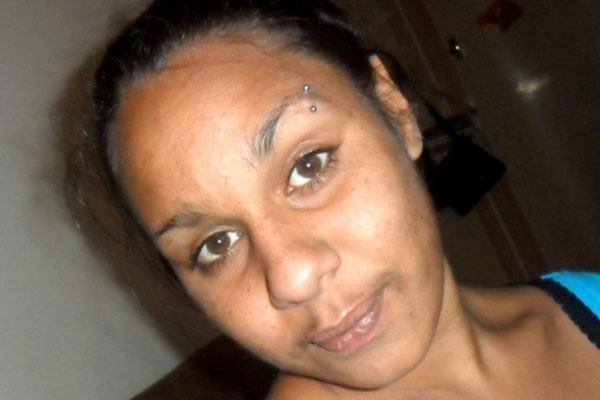When I think of strong women I have had the privilege of meeting in my life – I think of people like Rosalie Kunoth Monks, Larissa Behrendt, Nicole Watson, Marianne McKay, Celeste Liddle, Kelly Briggs, Vanessa Culbong, Karen Fusi, Bev Manton, and many, many others who are too numerous to name.
They may not be household names, they may not be people you immediately equate with feminist movements, but they are strong black women who deserve to be celebrated, who deserve to have their experiences given the same weight as non-Indigenous women.
I have always considered myself a feminist. But over the past few years, I’ve become increasingly uncomfortable with saying that, without first prefacing it with the fact that I am an Aboriginal feminist.
I mean it not to be divisive, but to acknowledge the history of oppression that Aboriginal women have had to face, not only from within our communities, but also from the wider society – the oppression that was often perpetrated by both non-Indigenous men and women alike.
Although I know that many non-Indigenous feminists recognise the different experiences of Aboriginal women in this country, we are not just combatting gender, but also climbing the barriers put in front of us because of our Aboriginality. The fact is, there is a deafening silence around the issues facing Aboriginal women.
Our voices are continually derided, placed to the sidelines, lost in the chorus of mainstream feminism, who perhaps unintentionally, do not realise that the fights for gender equality have always been within white structures, and have alienated many Aboriginal women, who are often fighting alongside Aboriginal men against the oppressive colonial settler state.
In 1993, one of my role models, and one of the women I mentioned previously – Professor Larissa Behrendt, wrote an article charting the historical differences between black and white feminist movements in this country and how it seeps into current times.
Sadly, Professor Behrendt’s critiques still ring true. I re-read her words, written 20 years ago, and felt as if she could have rubbed out the date and re-published it today.
Her criticism of white feminism rests on an understanding of black history – where white women were complicit in the oppression of not only black women, but black men.
Historically, Prof Behrendt wrote “White women were missionaries that attempted to destroy Aboriginal culture. They used the slave labour of Aboriginal women in their homes. White women were the wives, mothers and sisters of those who violently raped Aboriginal women and children and brutally murdered Aboriginal people. White women can be as racist as white men. White women have benefited economically from the dispossession of Aboriginal women”.
I say this not to shame non-Indigenous feminists, and mainstream feminist movements, but to open up the dialogue around the rights of Aboriginal women – the ability for us to pick our fights and to do so in a way that does not also shame our Aboriginal men, who also share stories of oppression.
I always feel uncomfortable in talking in a way that directly demonises Aboriginal men for the deep-rooted societal problems within our communities. It is not because I want to give men more voice in these debates above our women – because that is also a problem where even in Aboriginal protest movements, the concerns of Aboriginal women are overshadowed – but because in many ways, Aboriginal men have been partners in the political struggles to gain back basic human rights and revitalise cultures and languages.

For us, it is not simply a struggle between men and women.
As Prof Behrendt writes: “Aboriginal women are politically aligned with Aboriginal men. Aboriginal women fought beside Aboriginal men for the right to vote, the right to keep our children, the right to get our land back and have our sovereignty recognised. The already tight-knit Aboriginal community is bonded even more closely by the experience of racism. The fight against unjust police practices and violations of human rights has united the Aboriginal community. Aboriginal women feel that to turn against Aboriginal men and start treating them as the enemy is divisive and denies the strong cultural and political ties between Aboriginal people of both sexes.”
There have been so many examples of this happening – but I’ll talk briefly about the most obvious one.
When the voices of Aboriginal women aren’t relegated to the sidelines, they are often twisted to suit base political motives– like the media-driven moral panic around Aboriginal child sexual abuse that paved the way for one of the most racist pieces of legislation in living memory, the Northern Territory intervention.
It’s worth noting that Australia only became concerned about this problem when a non-Indigenous woman – Northern Territory Crown Prosecutor Nanette Rogers – aired horrific cases of child sexual abuse on ABC’s Lateline program. The fact this devastating problem had been raised by countless strong Aboriginal women for decades was completely ignored.
The concerns of Aboriginal women and men were swept aside. The result was not only a draconian policy that has stretched on for nearly a decade, but a more than quadrupling of self-harm and attempt suicide rates, and a crippling feeling of disempowerment across NT Aboriginal communities.
Aboriginal men were demonised as paedophiles and child abusers, and they were never given an apology. As Lingiari MP Warren Snowdon admitted to John Pilger in the film Utopia, the NT intervention was based on a lie about Aboriginal men.
I have seen the effect this has had on Aboriginal men in the Territory – I have sat in a room with Mutitjulu elder Bob Randall and his daughter, who both still cry about the traumatic impact of these slurs.
That’s not to say I am elevating the concerns of Aboriginal men above our women.
But it makes me cautious about other problems within our communities – like the staggering rates of domestic violence against our women. It is a problem felt by Aboriginal women all around the country, and one largely ignored by wider Australia, even in a time when these issues are finally, and thankfully gaining more airtime.
I was reading an excellent piece in the Monthly yesterday, and while it was comprehensive, there were only a few paragraphs about domestic violence against Aboriginal women.
But I have the same problem, because I feel this sense of accountability as a journalist in how I report on domestic violence issues. Not only do I feel a responsibility about breaking taboos and silences around these topics, but also how doing this could hurt Aboriginal communities more.
Will highlighting these disgusting and heartbreaking stories be used against Aboriginal communities in the long run? Will it just lead to more top down, paternalistic government policies which only end up impacting Aboriginal women more harshly?
Because in communities, the consequences of these assimilationist government policies always hurt Aboriginal women the most.
Look at the rising rates of Indigenous women being imprisoned – Aboriginal women are the fastest growing incarcerated group in the country. In Western Australia, one third of women who go to jail to pay off fines are Aboriginal. One of those women, Julieka Dhu, died in custody last year in excruciating pain after being repeatedly refused medical treatment.

We are still waiting for Julieka’s name and face to hit the covers of newspapers and lead news bulletins.
It has been because of the tenacity and strength of her family, who have staged a series of protests, that we have heard her story.
The cycle of incarceration is intrinsically linked to the high rates of Aboriginal child removals which are devastating our communities.
Children who have parents in jail are more likely to end up in child protection. And children who end up in child protection, are then more likely to end up in jail, continuing the cycle.
By locking up so many Aboriginal women, we are effectively ripping the heart out of these communities – we are creating a lost generation of children who are placed in a jail without bars by circumstance of their race.
And then we have the continuing Stolen Generation.
Earlier this year, I spent about a week with several members of the various Grandmothers Against Removals groups that have sprung up around the country.
They are led by Aboriginal grandmothers, who know the ins and outs of child protection policies in their various states better than most lawyers.
Today, nearly 15,000 Aboriginal children are in out-of-home care. Rates of Aboriginal child removal has gone up by 65 per cent since Kevin Rudd said sorry.
Before you say – well it is for their own good – consider this: the leading reason Aboriginal children are removed is because of “neglect”, a word that is often interpreted differently when caseworkers assess Aboriginal families.
Aboriginal families operate differently to non-Indigenous families – often, there are extended family the children can be placed in the care of, where they are still immersed in their Aboriginal nations, and given a chance to learn their culture and kinship.
Many of the grandmothers told me that they were knocked back as carers – and their children were often given to non-Indigenous carers, or precedence was given to the non-Indigenous side of the family.
In the Northern Territory, the government has just passed laws which make it easier for carers to adopt Aboriginal children until they are 18– with no consultation with the sector, let alone Aboriginal people.
Organisations like the North Australian Aboriginal Justice Agency and NTCOSS have raised concerns that there are no cultural plans put in place, there is no mechanism for Aboriginal families to get their kids back – and there are deep-seated concerns that Aboriginal parents won’t be notified that their children have been effectively stolen from them until they are 18.
Aboriginal children in the NT are overwhelmingly taken away because of neglect, because of Aboriginal poverty, because of a lack of essential medical, health and housing services in these communities.
Rather than address the underlying issues that result in what child protection labels “Neglect”, agencies simply take the children away.
While I’m sure non-Indigenous carers have the best of intentions, as in the days of the Stolen Generations, they are still complicit in the heartache and trauma that emanates from taking Aboriginal children.
It is a continuing problem – white women again involved in the oppression of Aboriginal women, and their right to raise their own children, to raise them in their culture, to teach them their kinship systems.
This is why I consider myself an Aboriginal feminist. The fights of black women are still fundamentally different from the fights of white women. I don’t care if Prime Minister Julia Gillard gets up in Parliament and calls out Tony Abbott for misogyny. This same Prime Minister – Julia Gillard – continued the NT intervention, which severely hurt Aboriginal women, and did nothing about the rising tide of Aboriginal child removals, while Labor continued to ride on the kudos of an apology that came too late and delivered too little.
I consider the Grandmothers Against Removals group as a black feminist movement. It is led by Aboriginal women and controlled by Aboriginal women. It also has the support of the Aboriginal community. The Aboriginal Grandmothers have become synonymous, in my view, with Aboriginal feminism.
As one uncle said at a recent protest “I am proud to call myself a grandmother”.
And although I am only 26, and still a long way off from having grandkids of my own, I am too.
* Amy McQuire is a Darumbul woman, and a senior report with New Matilda, an independent Australia media outlet. If you want to help fund Amy's work, you can subscribe to New Matilda here.
Donate To New Matilda
New Matilda is a small, independent media outlet. We survive through reader contributions, and never losing a lawsuit. If you got something from this article, giving something back helps us to continue speaking truth to power. Every little bit counts.





